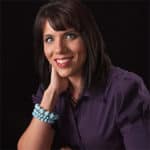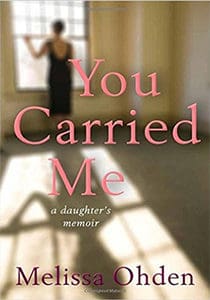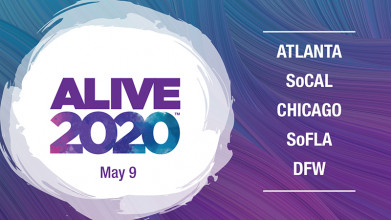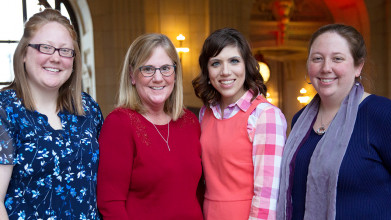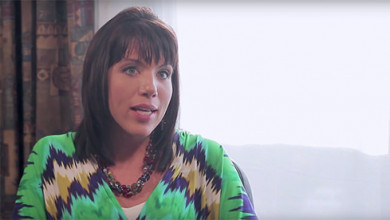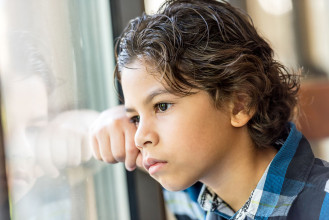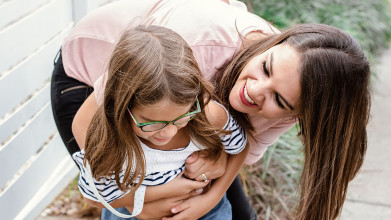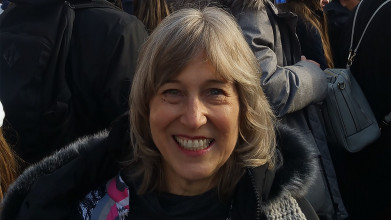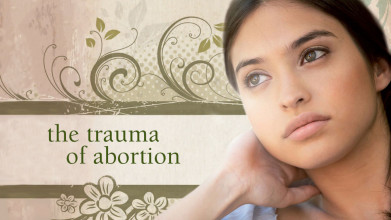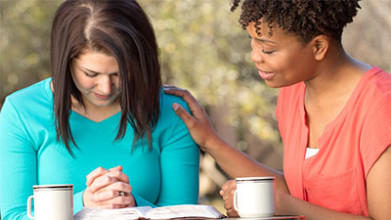John Fuller: You know it seems, that there are moments in time that really define someone’s life forever. And for Melissa Ohden, it was surviving a failed abortion. Here she is, telling just a bit of her incredible story.
Excerpt:
Melissa Ohden: Sadly, what I actually learned in recent years is that this was not her choice. She did not have any intention of having the saline infusion abortion that was meant to end my life. It was actually forced upon her against her will.
End of Excerpt
John: Well, stay with us, uh, today for Focus on the Family. You’ll find out how God’s grace has worked in Melissa’s life and how she became a voice for the voiceless. Your host is Focus president and author Jim Daly and I’m John Fuller.
Jim Daly: John, if anyone has not heard Melissa Ohden’s story, it is an amazing journey that she’s been on, literally from the very beginning. We are passionate about protecting the pre-born child here at Focus and our hearts resonate with Melissa’s who is equally passionate about this topic for obvious reasons. Uh, in fact, Melissa will be one of our speakers at ALIVE 2020 taking place in five different cities around the country on May 9th.
John: And we’re going to be in Southern California, South Florida, Atlanta, Dallas, and Chicago and you can register to join us on May 9th at focusonthefamily.com/broadcast.
Jim: Melissa Ohden is the founder and director of The Abortion Survivors Network, which seeks to educate people about survivors of failed abortions, while providing emotional, mental and spiritual support. She’s spoken on Capitol Hill and many other places for the pro-life cause. And she and her husband Ryan have two wonderful children.
John: We recorded here in the studio with Melissa too not long ago, and her story has had really an incredible impact on people’s lives. We’re going to begin now with a powerful statement from her about the realization that if she had been aborted, her two children would not be here today, and the impact that would effect generations to come.
Melissa: We live in this society that is now for years told people that abortion is just a woman’s choice, it’s a right, and that it doesn’t involve anyone else. And, of course, we haven’t talked about the babies. We haven’t talked about the men. We haven’t talked about the families who are forever impacted by that. And truly, everywhere I go, I always hear from families about the devastation that they, too, have experienced over the years, because of abortion. And as painful as that is, I think we also see the flip side, right? The beauty of the legacy of choosing life and the reality that, yes, even though my life should have ended through that abortion attempt, my life was spared. And because my life was spared, I have 2 beautiful daughters who will go on to have future generations to come. And that is an incredible blessing.
Jim: I think that right there – that’s a great way to open the program – that that’s the long-term impact of what God did in your life. But so, few people are defined, as John said, by the moment of their birth. I mean, your life has been defined by your first breath. That’s quite extraordinary. So, let’s reveal the story. Let’s go back and help our listeners know why you’re so passionate about the pro-life position, why you battle the abortion inc. industry. And, uh, let’s go back to your mom and your dad. Where were they at? What was happening in their life? And where does your story begin?
Melissa: Well, and I know a lot more now than I even did five or six years ago. I know now that my birth mother, you know, she fits most statistics, when it comes to abortion. She was 19 years old. She was a college student. She wasn’t married to my biological father, but they were actually engaged to be married when she found herself with this unplanned pregnancy. And, you know, sadly, what I actually learned in recent years is that this was not her choice. She did not have any intention of having the saline infusion abortion that was meant to end my life. It was actually forced upon her against her will.
Jim: And we’ll… let’s – we’ll pick that part of the story up a little later, because I – I think it’s powerful in the things that you’ve learned recently. Um, but, uh, describe for us your mom then, in whatever form, ended up in the hospital going through the abortion procedure. And what happened that night?
Melissa: Yeah, the type of procedure that was forced upon her was the most common one in the ’70s – the saline infusion abortion. And what it involved was injecting a toxic salt solution into the amniotic fluid surrounding the – in the womb. The intent of that toxic salt solution was to poison and scald me to death. And typically, the procedure lasted about 72 hours. The child’s life would be effectively ended by that toxic solution, and then premature labor would be induced with the intent of that deceased child then being delivered. What we actually know through my medical records is that I didn’t soak in that toxic salt solution for just three days. I actually soaked in it for five. They kept trying over those five days to induce her labor with me, and I just was not budging. And so finally, on the fifth day, her labor was successfully induced, and I was delivered at St. Luke’s Hospital in Sioux City, Iowa, believing that I would be this successful abortion. Of course, otherwise known as a deceased child. But lo and behold, I was actually born alive.
Jim: And that night – uh, or when you were born- describe the operating room, when it took place. What were you doing as that little child?
Melissa: It’s been very interesting, because more parts of my story have uncovered. And we actually know now that there was some argument in the hospital room that day. There were demands made to leave me there to die, when they realized that I was born alive. And I actually talked to a nurse earlier this year. She actually reached out to me. And she wasn’t actually there in that hospital room, but she was there in the NICU that day, when I was rushed in. And she was able to share with me that a nurse had actually taken me from that room where I was delivered and rushed me off to the NICU. And she actually shouted out, as she rushed me in, she said, “That darn Dr. Kelberg messed up.” He was, of course, the abortionist. But she went on and she said, “She just kept gasping for breath. She just kept gasping for breath, and so I couldn’t just leave her there to die.”
Jim: Wow. Think of that. Melissa, when you ponder all of that, you think of one part of the hospital where they’re taking the life of a child…
John: Hm.
Jim: …attempting to take your life – and then they rush you to another part of the hospital that then attempts to save your life. What are your thoughts about that schizophrenia?
Melissa: I’m sure you can see the tears well up in my eyes, right? I share this story hundreds of times a year, and I still get emotional about it, because it doesn’t make sense, right? In the grand scheme of things that somehow in one place, if someone believes that you should die, then – then you receive some sort of different care, right? My fate that day depended on who was working…
Jim: Wow.
Melissa: …and I thank God that that nurse was willing to fight for me and, you know, put her own job on the line. Babies like me who survived abortions at that hospital, like many other hospitals, if they survived, they were actually placed in utility closets in buckets of formaldehyde, where they were left to die. And they would be picked up later as medical waste.
Jim: Just to finish the job. Boy, that is disgusting. I’m sorry, but I think…
Melissa: It’s heartbreaking.
Jim: …that’s just – it’s heartbreaking that human beings would treat other human beings that way. The prognosis for you, uh, coming through this was not – was not positive. Um, there was a family that adopted you while you were recovering those first couple of months, right?
Melissa: Mm hmm.
Jim: Describe that prognosis. Describe the fact that you were adopted. Um, you didn’t know that – obvious – for many, many years, and we’ll move that story along. But – but what was that prognosis for you?
Melissa: Yeah, when I first survived, of course, the doctors had a poor prognosis. They didn’t think I would live for very long. And if I did, I would suffer from multiple disabilities. There were even mistakes made in my medical care that they thought would add to that level of poor prognosis. But, um…
Jim: You sound like a fighter…
Melissa: (Laughter).
Jim: …All the way, Man. I – gee.
Melissa: Which is funny, right? I guess God has brought out this side of me that I didn’t always recognize. I am historically one of the most quiet people you would ever meet. But I think within me…
Jim: Quiet and strong.
Melissa: …Yeah, God gave me this strength. But yeah, the doctors didn’t think I would live for very long. I – they thought I had a fatal heart defect. Certainly, I proved them wrong from the very beginning. And my parents first met me when I was still lying in an incubator, full of tubes and wires fighting for my life and…
Jim: You were about 3 pounds at birth, right?
Melissa: I was. I was 2 pounds, 14 ounces when I was delivered. And so, that actually told the medical professionals that my birth mother was much further along in her pregnancy than that 18 to 22 weeks that the abortionist had indicated on the medical records. And so, I was probably more like 31 weeks gestational age when that abortion was completed.
Jim: And that’s, in part, why you had so much strength, because you were older in the womb than they anticipated.
Melissa: Absolutely.
Jim: Um, they adopt you. You don’t know that you’re adopted, obviously at three years old, five years old. There was a point at which though it – it did come out. First, describe for us the adoptive parents. I love the heart of these people. I don’t know them at all. And I’ve got tears in my eyes now, thinking of their willingness to come down and say, “She’ll be ours.”
Melissa: Absolutely.
Jim: I mean, what a Christian statement.
Melissa: And not even she’ll be ours. I think their statement was “She’s ours.”
Jim: Yeah.
Melissa: You know. There was no “Will be.” My parents often say, you know, the minute they laid eyes on me, they fell in love with me.
Jim: Wow.
Melissa: And people ask about that a lot, right? Like, what is this like for your parents? And I always say, they have loved and supported me no matter what – no matter what – unconditionally. So, you know, I grew up knowing I was adopted, didn’t question it, didn’t think anything of it. What I, of course, didn’t know was the story behind my adoption. And so, that was the part that was kept secret from me until I was 14 years old.
Jim: So, at 14, you’re just moving along like every child, thinking this is my family, this is my home – and they are your family. But there was more to the story. How did that come out?
Melissa: That actually came out, because my older sister, as a high school student, faced her own unplanned pregnancy.
Jim: And this is their biological…
Melissa: No, my older sister’s adopted also…
Jim: OK.
Melissa: …and then we have a younger brother who is actually their biological child after 15 years of infertility and two adoptions.
Jim: The surprise came.
(Laughter)
Melissa: It happens that way a lot…
Jim: Yeah.
Melissa: …from what I gather. So, my sister and I – you know, we’re both raised to know about the sanctity of life and the gift of adoption. But, like so many young women in that position, my sister had a lot of fears. And so, my parents found out about that pregnancy and that she wasn’t entirely sure what decision she was going to make about it. And that’s when they broke their silence about my survival.
Jim: How old was she at that time?
Melissa: She was 18, so..
Jim: And you were 14.
Melissa: Mm hmm.
Jim: OK.
Melissa: Yup. And she hadn’t finished high school yet. And so – um, they told her the story of my survival, really hoping that she would understand that that decision she was facing was a huge one.
Jim: Yeah.
Melissa: And so, you know, I often joke my parents learned through that experience that sisters pass along stories very quickly. Because, after my sister found out the story of my survival, it came down to me very quickly through her, before my parents could even get to me.
Jim: And it’s actually heart-wrenching…
Melissa: It is.
Jim: …the way that happened. It was in the heat of battle, you might say, within the family. How did she say it to you? Because I – my heart went out to you when I heard this, as a 14-year-old girl. How did she say it? I’m sure she regrets it.
Melissa: Oh, absolutely.
Jim: But…
Melissa: Absolutely.
Jim: But how did that come down?
Melissa: She actually shouted out to me in the middle of an argument. She said, “You know, Missy, at least my biological parents wanted me.” And I can tell you how it felt like the wind was just knocked out of me, because…
Jim: Yeah, I’m sure you’re trying to figure out what does that mean?
Melissa: Absolutely, right?
Jim: What do you even mean?
Melissa: Yeah. I thought we’re on equal footing, right? We were equally loved by our biological parents, who placed us for adoption. We’re equally loved by our adoptive parents. And so, I never could have fathomed what those words actually meant.
Jim: Yeah.
Melissa: But I saw very quickly what they meant.
Jim: It was… It was a wound.
Melissa: Mm hmm.
Jim: Yeah, that’s so hard. Um, in that context, how did your parents then – how did they wrap their arms around you? How did they respond to that pain that you were feeling – the dagger that you got from your sister?
Melissa: I knew, when I started to speak to our mother about it, because – you know, looking back on it, I can’t remember where my dad was that night. But I think it was meant to be that way – that it was just my mom and I. And I knew, as I told her the story about the words my sister said, you know, I knew that there was something she didn’t want to talk about.
Jim: Right.
Melissa: And so, it really took hours for her to finally share the words. She said, “You know, Missy, your biological mother had an abortion during her pregnancy with you, and you survived it.”
Jim: Wow.
Melissa: And so, it was like two sucker punches right in a row, right? (laughter)
Jim: Right.
Melissa: And it’s hard to be 14.
Jim: Oh, my goodness, yeah. You’re dealing with the normal stuff. And then to feel that rejection, I’m sure, and then the idea that she attempted to end your life – your mom…
Melissa: And I had never…
Jim: …That had to be deep.
Melissa: It was. And, you know, people often ask me, well, you know, didn’t you ever feel different growing up? Did you ever have memories? Or, you know, you knew you were born premature. But for me back then, I didn’t know that abortions could fail. I didn’t know that children could live. And in all honesty, if I would have known those things, I never would have thought for a second that I was one of them.
Jim: Yeah. Well, Melissa – and my heart goes out to the women who are listening, that may have had an abortion. And even hearing this is too hard. It’s crushing them right now. Uh, please know there’s help here, not condemnation. We want to put an arm around you. God is a forgiving God. He’s a God of grace. And you’re going to hear more of that story from Melissa as we talk about that reuniting with her mom. If you’re in that spot, please call us.
John: This is Focus on the Family with Jim Daly and, uh, Melissa Ohden is our guest today. If you’re in need of Christian counseling, we have help available here and you can schedule a consultation when you call. Um, the counselors can also direct you to some resources in your area. Someone to have an ongoing counseling relationship with to help in that healing journey. Our number is 800, the letter A, and the word FAMILY. 800-232-6459. And we’ll also encourage you to stop by our website for Melissa’s book You Carried Me: A Daughters Memoir. That’s at focusonthefamily.com/broadcast.
Jim: Melissa, with that disturbing news, um, it put a seed in your heart about finding your biological parents. Describe that yearning. Did it start right away at 14, or was it a couple of years later? What began to drive you to say, OK, I want to know who they were, who they may be still?
Melissa: You know, I think that was placed in my heart the minute I heard that news. And, you know, I think part of that was that I wanted to find answers, right? To know maybe what does – what could have driven that decision to try to end my life? So, I think it makes sense to most people that I would want answers. But, you know, the other huge piece of that is that, in my heart, I loved them, no matter what decision they made about my life.
Jim: That’s what’s so beautiful about your story. I don’t hear any bitterness toward them at all, ever.
Melissa: I had to work through that. You know, that first night that I heard the truth, I was angry, because I couldn’t understand how they could make that decision about my life. But truly, I did not stay angry for very long because, truly, there’s just not anything for me to be angry about. I’m alive, and I’m well, and I’m blessed. And I – I realize that I’m as much a sinner as everybody else.
Jim: Well, and in fact, Melissa, at that point in your life, at 14, I mean, I – I’m sure the feeling of rejection, the feeling of loss, the feeling of – who’s in my corner, drove you to some bad behavior as well…
Melissa: It did. And that was…
Jim: That’s probably your dark part of your story. What happened there?
Melissa: Yeah, I – I often describe to people, right? That we all have chapters in our story that we don’t ever want to read aloud.
Jim: Right.
Melissa: We have chapters in our book of life that we don’t want anybody to read. And I was one of them, right? And so, I had to include that in the book, because that’s part of my story of how God has continued to redeem and restore my life. So, you know, developed an eating disorder, developed alcohol abuse, engaged in a horrible dating relationships early on, after finding out that news about my life, because I was in so much pain. I didn’t want to be this person long ago who survived an abortion. I wanted to be what I thought was like everybody else, right? Of course, now I know we all have our pains in our hearts, and we suffer. Uh, but back then, I wanted to distance myself from the pain that I felt. But truly, God saved me from myself so long ago.
Jim: Isn’t that interesting? And I – because, again, a parent, or even a listener who’s 15, 16, might be going through that same kind of self-harm. And we know that scream, it’s – for – because you’re in pain. But for you at that moment, how did God get a hold of you? How did – you’re raised in a Christian home, so I mean, that has a benefit, but it’s not an inoculation.
Melissa: You’re so right. And I hear that so often from parents, right? Who say, “Oh, my goodness, you know, I raised my children this certain way, and they’re still walking down this path.” And I kind of smile and nod my head and say, “Yeah, we live in a broken world, right? We live in…”
Jim: But don’t give up hope.
Melissa: Absolutely, I am living testament of that. You know, God truly performed that work in my life very early on. You know, I think the greatest pieces of change for me came when I not only recognized, but truly – truly allowed myself to accept the fact that He makes no mistakes. He does not make any mistakes. You know, we live in this society that – that branded me as a mistake long ago, and that caused me a lot of suffering. And so, when I really…
Jim: Well, and you had to believe it to a point, to begin to act the way you did…
Melissa: Yeah, absolutely.
Jim: Right? So, you were buying the lie, in essence.
Melissa: Absolutely, yeah. “Maybe I am a mistake.” And, you know, at some point, yeah – “Now I’ve sinned, and maybe I’m too far gone, right? God can’t love me anymore.” And that’s the beauty in it, right? We think that maybe God has left our side. And he’s always there. We are usually the ones who turn our backs…
Jim: Yeah.
Melissa: …to Him.
Jim: So, 14 clicks away, 15 clicks away. Where does God begin to say, “You’re mine, you’re worthy, I love you”? Where did that begin to make sense to you?
Melissa: 16, 17, you know, pretty early on in that process. Because I knew, right? When I was making those choices, it was like, oh, you know, this is not who God made me to be. And so, really, I always encourage people to say take it one day at a time, maybe it’s one hour at a time, one good choice at a time. It’s not like you can wake up one day and suddenly go, yeah, you know what? I got this. Maybe some people can do that. I’m not one of them. (laughs) Um, I have to take…
Jim: At least, if I can just get an hour…
Melissa: Absolutely.
Jim: Yeah, wow. That is – that’s inching your way out of that hole. For those that may have joined us a little late, you know, your birth mom basically, through pressure – and we’ll learn more about this next time – uh, attempts to go through with an abortion. You’re saved, through that, both by your physical strength, and I’m sure the hand of God – there is no doubt in my mind. And you survive. A loving nurse notices you gasping for air. And then all of the way forward, you know, at 14, learning what the truth was and the fact that, uh, your parents adopted you out of that environment. The next step, though – you’re reconciling your behavior. You’re getting back on track with the Lord. Healing is taking place…
Melissa: Mm hmm.
Jim: …I’m sure – 17, 18. How are you feeling, at this point? What is your attitude about God, about your environment? Was there no bitterness? Uh, what was there in your heart?
Melissa: Yeah, the bitterness had left. You know, I started to understand more about the dynamics of abortion and, you know, truly how abortion affects all of us. And so, you know, God really placed it on my heart that this was a story that needed to be shared and not, you know, for my benefit, but to give Him glory and in the hopes that it would save lives, and not just for children, but for women and men, too. And so, yeah, by the time I was 19, I – I knew that I was called to come forward with this story. Uh, but I think like a lot of young people, I was silenced by the culture that we live in. I went through a period, where I didn’t share a lot, because I was told, either implicitly or explicitly, you shouldn’t talk about things like this.
Jim: Right. But that – still that yearning in your heart to figure out what went on. That continued to drive your search and your idea about how do I reconnect? Um, what was that about? What age were you, when you really earnestly began saying, I want to find out who they were – your parents…
Melissa: Yeah.
Jim: …your birth parents? What began to shape that drive?
Melissa: Yeah, I was 19 when I started looking for them. And I think some of it was, you know, certainly just in that place of young adulthood, where you’re still, you know, trying to figure out who you are, where you’re going and – and certainly where you came from. And so, back then, you know, that’s also when the Internet came out – not to date myself at all, but, uh…
(Laughter)
Melissa: We’re safe talking about that in this room, right? We can remember when the Internet wasn’t always at our fingertips. And honestly, that – that technology really drove my search. It allowed me to…to search in ways that wouldn’t have been possible. But even though that opened this new horizon, it took me over 10 years to find them.
Jim: Yeah. And that – that had to be – it’s something simmering always, isn’t it? It’s just on the back burner. You can go to school, which you did. You had a – a college career. You did all those normal things. But I’m sure, in the background was this burning desire to close the chapter – this open wound, in some ways. Um, did that day happen? Did you connect?
Melissa: Yeah, I found my biological parents in 2007. And when I found out who they were, I actually discovered that I was living in the same city as my biological father.
John: Oh, my.
Melissa: But what I knew, of course, was that it was the city where my birth mother’s abortion had taken place. But it was over 30 years later. I couldn’t have fathomed that…
Jim: You assumed everybody was gone – moved on.
Melissa: Right, and maybe they weren’t even from that area, right?
Jim: Right.
Melissa: And there he was. And so I ended up sending him a letter after months of praying about it – sent it to his office and not his home, wanting to protect him a little bit in his life and, you know, of course, let him know that I knew the truth, that I’m not angry, I’m not bitter, I’m just incredibly blessed and, of course, that I’d be waiting if he ever wanted to connect or have a relationship. And it’s been over 10 years now, with no response.
John: Mm.
Jim: No response. And, Melissa, I mean, we have to end today. And we’ll pick the story up tomorrow. But, what an amazing, emotional rollercoaster for you to send this letter, to pour your heart out to your birth father and to hear nothing back. You had to feel, uh…
Melissa: Rejected.
Jim: …once again rejected, right? Same feelings. How’d you take that to the Lord? Did you say, “OK, God, I’m going to step out in faith. I’ll remain strong”? Um, what was that dialogue with the Lord like?
Melissa: Absolutely. You know, when we talk about laying everything at His feet, I mean, truly, it is laying it at His feet and saying, I can’t handle this on my own, right? Emotionally, I cannot handle the weight of this. And so, I will give it to you. And you know what it’s like to suffer. And so, you know, truly, I laid that at His feet and said, I trust in You. I trust that Your plan in the midst of this is far greater than what I wanted to see…
Jim: Yeah.
Melissa: …for myself.
Jim: Boy, Melissa, I love that iron toughness that you’re expressing there, in terms of your faith – that nothing’s going to move me. I can relate to that, with my background. And it’s something – if you haven’t been totally wrung out – you know, like, great Scripture says, “He’s close to the brokenhearted and saves those crushed in spirit.” You’d been crushed in spirit, and yet His heart was for you in every way. And, man, we’ve got to break it here and come back. But I’m in tears, you’re in tears.
Melissa: (Laughter).
Jim: And, I am looking forward to what you will share with us next time. Thank you for being with us today.
Melissa: Thank you.
John: Well, we have covered so many different emotions during this, uh, past few minutes and as we said earlier, if you’re really struggling, call us here at Focus on the Family. We care, and we can encourage you, and offer some resources. And it would be a privilege for us to do that. Uh, we’re also very excited about saving babies through Option Ultrasound as we help moms who are considering abortion to re-think that decision when they get to see their baby in the womb through an ultrasound.
Jim: And John, uh, the new number of babies saved through Option Ultrasound is now up to 459,000! And, uh, we are thrilled with what God is doing through that program. And I’d like to ask you to be a positive force in the culture and support us to help save more babies by making a monthly pledge of any amount to Focus. Keep in mind that every $60 you give, saves another baby’s life. We have those metrics we’ve been doing this for fifteen years. We know it’s $60 to save a baby’s life. But whatever amount you pledge, we’ll thank you by sending a copy of Melissa’s amazing story in her book, You Carried Me. And if you can’t make a monthly pledge, we get that. Um, we’ll be happy to send you the book for a one-time gift of any amount.
John: Join us in saving more babies and helping their mom’s as well, and get your copy of Melissa’s book, You Carried Me, when you call us. Our number is 800, the letter A, and the word FAMILY. Or donate and get the book at focusonthefamily.com/broadcast.
Jim: And finally, we mentioned at the start that Melissa is participating in ALIVE 2020, taking place in Southern Cal, Dallas-Fort Worth, Chicago, Atlanta, and South Florida. It’s May 9th, and we’ll have live music, speakers, and the keynote will be 4D ultrasounds on those big screens of, uh, a baby right there in the third trimester.
John: It’s going to be wonderful and I do hope you’ll plan to join us. All the details and an opportunity for you to register to join us at focusonthefamily.com/broadcast. On behalf of Jim Daly and the entire team here, thanks for joining us for Focus on the Family. I’m John Fuller, inviting you back next time as we hear more from Melissa, as we once again help you and your family thrive in Christ.











